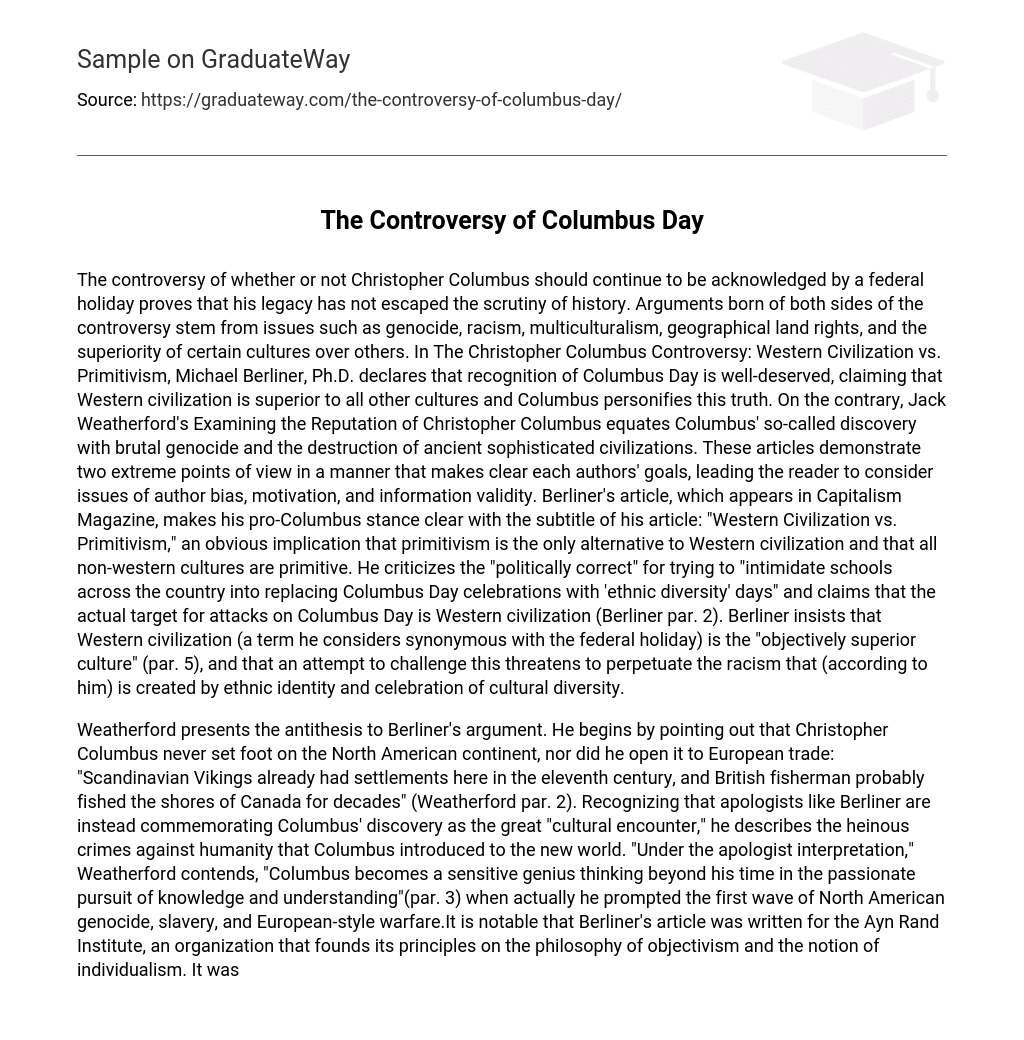The controversy surrounding Christopher Columbus and whether he should be recognized on a federal holiday indicates that his legacy has not escaped historical scrutiny. Arguments on both sides of the debate focus on topics such as genocide, racism, multiculturalism, land rights, and cultural superiority. In Michael Berliner’s article titled “The Christopher Columbus Controversy: Western Civilization vs. Primitivism,” he argues in favor of Columbus Day, asserting that the recognition is well-deserved as Western civilization is superior to all other cultures, with Columbus embodying this truth. Conversely, Jack Weatherford’s piece titled “Examining the Reputation of Christopher Columbus” associates Columbus’ supposed discovery with brutal genocide and the eradication of advanced ancient civilizations. These articles present two extreme perspectives, highlighting the authors’ goals and prompting readers to examine author bias, motivation, and the validity of information. Berliner’s article in Capitalism Magazine explicitly takes a pro-Columbus stance, evident in its subtitle “Western Civilization vs. Primitivism,” which implies that primitivism is the only alternative to Western civilization and suggests that non-Western cultures are primitive.In his critique, Berliner voices disapproval of the “politically correct” movement’s efforts to replace Columbus Day celebrations with “ethnic diversity” days in schools nationwide. He asserts that the true aim of attacking Columbus Day is Western civilization itself. Berliner argues that Western civilization, which he views as equivalent to the federal holiday, is an objectively superior culture. He warns that any attempt to challenge this notion may perpetuate racism, which he believes stems from ethnic identity and the celebration of cultural diversity.
Weatherford challenges Berliner’s argument by highlighting that Christopher Columbus did not actually discover the North American continent or open it to European trade. He points out that Scandinavian Vikings and British fishermen already had settlements and engaged in trade there years before Columbus arrived. Weatherford criticizes apologists like Berliner who interpret Columbus’ actions as a cultural encounter, arguing that this interpretation ignores the heinous crimes against humanity that Columbus brought to the new world. He asserts that Columbus was responsible for the first wave of genocide, slavery, and European-style warfare in North America, contradicting the notion of him being a sensitive genius ahead of his time. Weatherford highlights the affiliation of Berliner’s article with the Ayn Rand Institute and Capitalism Magazine, suggesting that Berliner’s distorted historical facts are designed to please his pro-capitalistic audience. Informed readers recognize that Berliner’s descriptions of Western civilization are exaggerated and manipulated to support his extreme views.In his description, Berliner characterizes the inhabitants of present-day United States as nomadic, living hand-to-mouth, with no written language, division of labor, minimal agriculture, and few permanent settlements. However, Berliner fails to provide historical evidence to support these assertions. In truth, historical records demonstrate that Native Americans had sophisticated agricultural techniques and multiple permanent settlements before Columbus’ arrival. While Berliner does acknowledge the occurrence of endless wars among Native American civilizations, he overlooks the fact that the introduction of full-scale warfare only happened after English and French conquests. Columbus and Cortez resorted to military violence to subjugate free peoples, initiating a tradition of public violence and death. Berliner deliberately ignores this fact as it contradicts his argument that Western civilization is objectively superior and serves as a redemption from the “nasty” and “brutish” existence of civilizations predating its dominance.
Weatherford, an anthropologist at Macalaster College in St. Paul, Minnesota, wrote an article for the Baltimore Evening Sun, targeting both the American public and the academic community. He accuses the American public of creating legends around Columbus, while emphasizing that popular folklore has distorted historical truth. While Westerners celebrate Columbus for integrating Western values into American Indian communities, academics and the victims of Columbus recall the horror and tragedy he brought to the New World. Weatherford highlights the plight of the Taino people, who were captured as slaves by Columbus, subjected to beatings, rape, torture, and murder, with their bodies even used as food for hunting dogs. Unlike Berilner’s sweeping generalizations about the benefits of Western culture in North and South America, Weatherford uses specific instances of brutality to support his viewpoint.Using specific facts, Weatherford’s information can be easily understood as valid, although his word choice suggests a clear bias. Berliner, on the other hand, appears to be proclaiming a “yay, America!” rally cry. Berliner is clearly attempting to support the Americans’ belief that “West is Best,” while Weatherford offers a contrasting view from a different perspective. By analyzing the differences between these viewpoints, including the biases of the authors and the validity of their information, readers can form their own conclusions about the controversy surrounding Columbus Day.
Berliner, Michael. “The Christopher Columbus Controversy: Western Civilization vs. Primitivism.” Capitalism Magazine Oct. 1999. Accessed 08-01-2000
Weatherford, Jack. “Examining the Reputation of Christopher Columbus.” Feb. 22, 2000. Accessed





